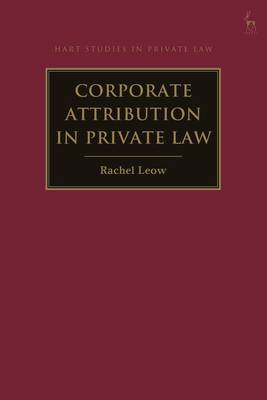
Je cadeautjes zeker op tijd in huis hebben voor de feestdagen? Kom langs in onze winkels en vind het perfecte geschenk!
- Afhalen na 1 uur in een winkel met voorraad
- Gratis thuislevering in België vanaf € 30
- Ruim aanbod met 7 miljoen producten
Je cadeautjes zeker op tijd in huis hebben voor de feestdagen? Kom langs in onze winkels en vind het perfecte geschenk!
- Afhalen na 1 uur in een winkel met voorraad
- Gratis thuislevering in België vanaf € 30
- Ruim aanbod met 7 miljoen producten
Zoeken
€ 98,45
+ 196 punten
Uitvoering
Omschrijving
Looking at key questions of how companies are held accountable under private law, this book presents a succinct and accessible framework for analysing and answering corporate attribution problems in private law.
Corporate attribution is the process by which the acts and states of mind of human individuals are treated as those of a company to establish the company's rights, duties, and liabilities. But when and why are acts and states of mind attributed in private law?
Drawing on a wide range of material from across the disparate areas of company law, agency law, and the laws of contract, tort, unjust enrichment, and equitable obligations, this book's central argument is that attribution turns on the allocation and delegation of the company's own powers to act. This approach allows for a much greater and clearer understanding of attribution. A further benefit is that it shows attribution to be much more united and coherent than it is commonly thought to be. Looking at corporate attribution across the broad expanse of the common law, this book will be of interest to lawyers across the common law world, including the United Kingdom, Australia, Canada, and Singapore.
Corporate attribution is the process by which the acts and states of mind of human individuals are treated as those of a company to establish the company's rights, duties, and liabilities. But when and why are acts and states of mind attributed in private law?
Drawing on a wide range of material from across the disparate areas of company law, agency law, and the laws of contract, tort, unjust enrichment, and equitable obligations, this book's central argument is that attribution turns on the allocation and delegation of the company's own powers to act. This approach allows for a much greater and clearer understanding of attribution. A further benefit is that it shows attribution to be much more united and coherent than it is commonly thought to be. Looking at corporate attribution across the broad expanse of the common law, this book will be of interest to lawyers across the common law world, including the United Kingdom, Australia, Canada, and Singapore.
Specificaties
Betrokkenen
- Auteur(s):
- Uitgeverij:
Inhoud
- Aantal bladzijden:
- 280
- Taal:
- Engels
- Reeks:
Eigenschappen
- Productcode (EAN):
- 9781509941827
- Verschijningsdatum:
- 15/06/2023
- Uitvoering:
- Paperback
- Formaat:
- Trade paperback (VS)
- Afmetingen:
- 156 mm x 234 mm
- Gewicht:
- 399 g

Alleen bij Standaard Boekhandel
+ 196 punten op je klantenkaart van Standaard Boekhandel
Beoordelingen
We publiceren alleen reviews die voldoen aan de voorwaarden voor reviews. Bekijk onze voorwaarden voor reviews.









